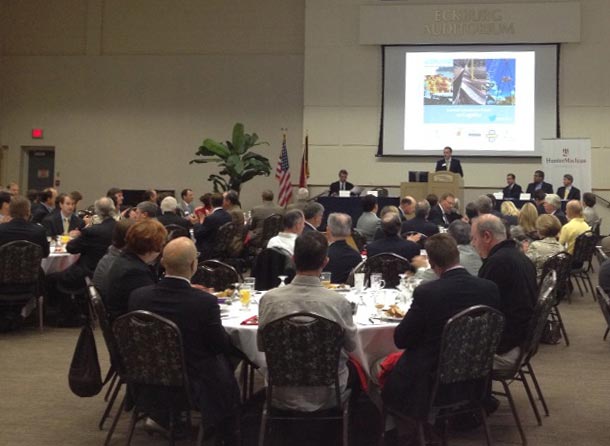October 16, 2013
Special to the Savannah Business Journal

Rick Blasgen, president and CEO of the Council of Supply Chain Management Professionals, says the logistics industry is expanding as the U.S. economy continues to recover.
“We’re coming back online as there’s a growing demand for products,” he told an audience of more than 170 local business leaders at HunterMaclean’s Critical Issues Forum, which took place at Savannah Technical College on October 10. “There’s no question that the logistics industry plays an important role in the U.S. economy.”
Blasgen reports the U.S. logistics industry is a $1.3 trillion field representing 8.5 percent of the nation’s gross domestic product. The industry is fueled, in part, by the growing desire for customers to order from smart phones, laptops and other electronic devices as part of a growing trend he called “multi-channel madness.”
Blasgen, who served as the event moderator, was joined by a panel of local logistics experts including Georgia Ports Authority executive director Curtis Foltz, Pier 1 Imports distribution center director Frank Casaine and Gulfstream Aerospace vice president of law and affairs Jay Neely.
Foltz offered an overview of the port system in Georgia, which provides more than 352,000 jobs statewide and has an estimated economic impact exceeding $18.5 billion.
“There’s not a state that understands logistics and supports logistics better than the state of Georgia,” he said.
However, Foltz cautioned that the United States faces stiff competition from state-of-the-art ports in China, India, Germany and other countries around the world, due in part to aging infrastructure in the U.S.
Harbor depth continues to be a challenge in Georgia, which has struggled to secure federal funding to deepen the shipping channel to the Georgia Ports Authority terminal in Savannah.
“Our port is the shallowest major port in the world,” he observed. “We need to get our harbor deepened here.”
Frank Casaine of Pier 1 Imports offered insight into the fact that changing consumer habits are driving the logistics industry, as more and more customers buy items online. An estimated 40 percent of online sales are currently conducted from smartphones, rather than PC’s, he said.
“We need to be educated about the consumer patterns of the future,” Casaine explained. “Are we doing what we can to keep up with our customers?”
Jay Neely of Gulfstream emphasized the fact that building a Gulfstream 650 business jet requires a complex supply chain process that, quite literally, spans the globe. Specialized materials and parts must be shipped from around the world to Gulfstream manufacturing facilities in order to meet production deadlines.
“Logistics is not scalable,” he said. “You have to take a fresh look and learn lessons from others in the industry if you want to be successful.”
The Savannah Critical Issues Forum was presented by HunterMaclean in partnership with the Savannah Economic Development Authority, the Savannah Area Chamber of Commerce, the Georgia Center of Innovation for Logistics and the Council of Supply Chain Management Professionals.
The event included opening remarks by attorney Brad Harmon, head of the logistics practice at HunterMaclean, and marked the 17th discussion in an ongoing series of Savannah Critical Issues Forums addressing timely issues affecting the Savannah community.




